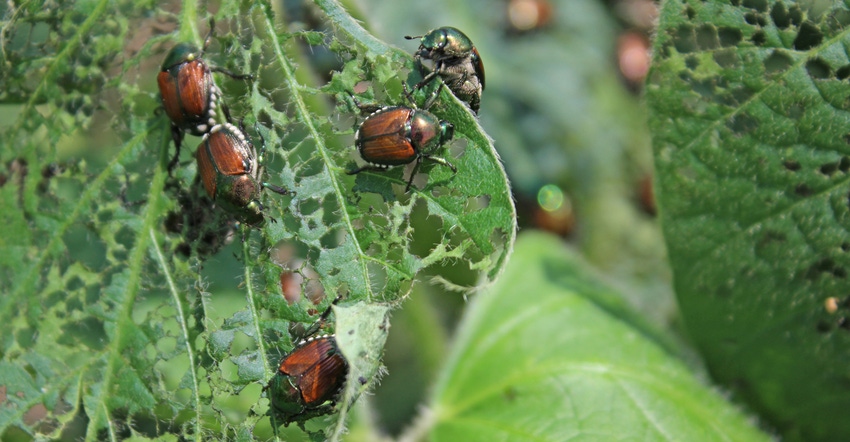
The break from Japanese beetles feeding on Missouri crops may be over in 2022.
For 10 years, there was a buildup of this invasive insect in the state. Then came the 2018 drought, and the grass needed for the larvae to feed and survive died, knocking down the larvae populations. It resulted in a sharp decline in Japanese beetle populations across the state in 2019.
“That being said, we're going to expect this to basically mimic what we had at the beginning of the invasion,” University of Missouri Extension entomologist Kevin Rice explained to a group gathered at the MU Crop Management Conference. “It is still an invasive insect. So, even though the population crashed in 2018, we're going to expect that to rise continuously as the years go on.”
However, the Japanese beetle may not be as damaging as farmers think to corn or soybean crops. It all depends on feeding time. Understanding when damage occurs and thresholds for treatment are keys to staying ahead of this pest.
Feeding on silks
When it comes to corn, the primary economic damage is during silk production, Rice said.
In Missouri, adult beetles emerge starting in June and feed for about 45 days. Feeding on the corn silk before ears are fully pollinated reduces ear fill and ultimately leads to yield loss. When farmers see an average of three or more adults per ear feeding on silk, and silks are clipped to 0.5 inches and pollination is less than 50% complete, they should consider a foliar insecticide. Rice warned that one spray may not keep the beetles at bay for the entire season.
Japanese beetles move from one field to the next. Just because a farmer sprays one field and kills hundreds of them, he explained, the beetles may move right back in from a neighboring field.
Soybean scouting
It makes farmers uneasy walking through a field of soybeans seeing lacelike skeletons on leaves. When it comes to soybeans, extensive defoliation from Japanese beetles looks bad, but rarely causes yield damage.
The greatest impact occurs during flowering and pod fill. Soybean growers should consider insecticide treatments when damage is greater than 30% at vegetative stages and 20% at reproductive stages of the plant.
Help is here
There is a parasitoid wasp species that only attacks Japanese beetle and was released by USDA in the eastern U.S. It was released at Meramec State Park in 1999, and researchers believe there is an established population in Missouri. However, the distribution level of the wasp across the state is still unknown.
Rice noted the wasp is effective, killing 60% of Japanese beetle larva when in the area. “Hopefully, as the Japanese beetle population increases again in Missouri, we'll see that wasp species provide some knockdown,” he said.
Rice has a graduate student continuing work on attract and kill with insecticide-infused netting. “The nets do provide equivalent control to insecticide sprays when you put those nets up along soybean borders,” he added.
About the Author(s)
You May Also Like






